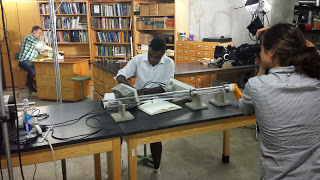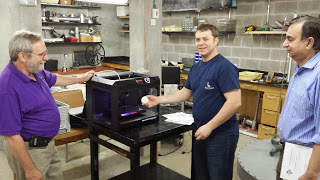I am William Slaton and This is How I Work
Today, I am interviewing William Slaton for the “This is How I Work”.
Current Job: Associate Professor in the Physics & Astronomy Department at the University of Central Arkansas.
Current Location: Conway, Arkansas USA
Current mobile device: Samsung S4
Current computer: Windows box
Can you briefly explain your current situation and research to us?
I’m a tenured associate professor at a primarily undergraduate state institution (PUI). We do not have a MS or PhD program in Physics. We do work with undergrads to develop research projects – some of which result in publications. My area of research is in acoustics, sound and vibration – specifically aeroacoustics at this moment.
What tools, apps and software are essential to your workflow?
In terms of research: Python, LaTeX, and DropBox. We are learning how to use RaspberryPi’s to serve as low-speed, low-cost, data acquisition devices.
What does your workspace setup look like?
I have an unshared university office in the building I teach and I share research lab space(same building) with a fellow acoustics faculty member (who is also my department chair). I recently (as in few years ago) inherited this larger lab space when we decommissioned a low-energy van de graff accelerator beamline. I’ve added two pictures that show part of the space.
What is your best advice for productive academic work?
Be able to block out quiet time when you are uninterrupted. When I first started as a single assistant prof I would get to work at 4AM to have several hours of absolute quiet to get ahead on lecture notes and research. Now I can block out time on my schedule to not be bothered.
How do you keep an overview of projects and tasks?
Many, many prioritized To-Do Lists!
Besides phone and computer, do you use other technological tools in work and daily life?
Twitter is a great distraction and a good resource for beginning teachers. Lots of folks out there with great ideas. We have some standard laboratory equipment in addition to a wood/soft metal machine shop. When I started here I took machine shop classes at a nearby trade school to learn how to use the equipment. My training (PhD and PostDoc) had been at institutions that had full-time machine shop and electronics technician staff. I found out quickly that I needed to learn how to do these tasks myself if I was going to be as successful as I wanted to be.
Which skill makes you stand out as an academic?
I try to come up with unique, individualized projects for each undergraduate I take on. I feel the projects need to be something they fully understand and aren’t just turning a crank. This may mean the projects start out simple and can only advance so far by the time to student graduates. However, if a project results in some nice data I work with the student to get it published somewhere. The student writes the paper, I help edit, we fight we fight with reviewers, and they hopefully get to see it in print eventually. I recently graduated a student who did work on a seemingly boring gravity-driven draining bucket problem. We found that the physics education literature was lacking a good explanation of this experiment at the undergraduate level that explored the effect of the vena contracta. This whole project was born out of a need for a project for her differential equations course. In the end it was published in The Physics Teacher. I am lucky that my department and college recognizes that this experience for the undergrad was very important – the lack of prestige of the journal is inconsequential to the bigger picture.
What do you listen to when you work?
I prefer silence. I sometimes put ear plugs in to block out as much as I can. My office is on a main hallway so every hour or so classes let out and its a major distraction.
What are you currently reading? How do you find time for reading?
Back when I was single I used to read quite a bit. Now that I’m married I find I don’t have much time …. Last book I read was Proof, The Science of Booze by Adam Rogers. I don’t watch TV – I spend time trying to solve Project Euler puzzles or mini coding projects.
Are you more of an introvert or extrovert? How does this influence your working habits?
I’m an introvert at heart who has learned how to perform as needed in the academic environment to get things done. I learned this by watching my advisor and the research lab’s direct while in graduate school. I still need to have down-time without people to recharge but just know that during the day I am “on.”
What’s your sleep routine like?
If all is going well its sleepy time my 9-9:30PM at night and awake by 6AM. If I am stressed, behind on tasks, etc then I will wake up at 4AM (or earlier) and think about things (or work). I tend to work 6 days of the week – this is sort of necessary because I take on too much at work and then have to work extra to get it all done. I need to learn to not do this – I’ve stopped going to the gym which is a mistake. :-/
What’s the best advice you ever received?
Best advice I ever got was all nonverbal. As mentioned above, I paid attention to how my advisor and, more importantly, my research lab’s director conducted themselves with students, faculty, funding agency heads, competitors at other labs. I learned to pay attention – especially to who was present and what they wanted/needed – which informed what I needed to do (or not do). Paying attention to who makes things happen in your field is very important when it comes to money and jobs. I also learned, by watching them, that I wasn’t cut out for an academic job at a PhD granting institution. That realization early on helped me position myself for other opportunities.
I would add that folks looking for academic jobs should not overlook primarily undergraduate institutions. Often you have a greater impact on students at a PUI then at a PhD granting institution but jobs at PUIs come with unique challenges. You will need to be a jack-of-all-trades.
Another bit of advice is to talk with people outside of your department or research area. A very fruitful collaboration was hatched over beers with a Plant Biologist!


